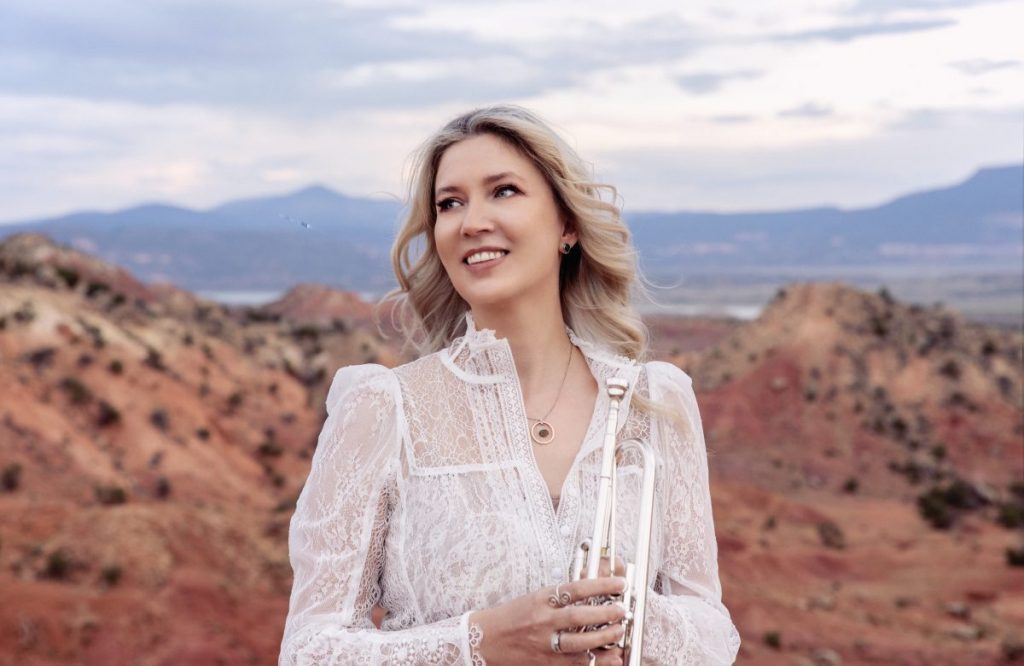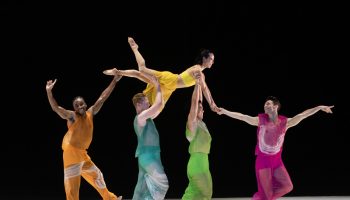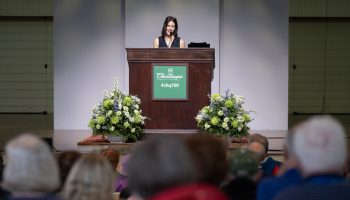
Sarah Russo
Staff writer
As the season at the Institution comes to a close, the Chautauqua Symphony Orchestra is ending its summer the way it started: with music.
The CSO ends its season under the baton of Principal Pops Conductor Stuart Chafetz and features trumpet player Mary Elizabeth Bowden as soloist. The final concert begins at 8:15 p.m. tonight in the Amphitheater.
Bowden became interested in music when she started playing cornet at 10 years old. Her two brothers played trombone and horn, and eventually all three siblings studied under the same brass teacher.
“He took us to many soloist and chamber concerts as well, including my favorite trumpeter Sergei Nakariakov,” Bowden said. “Nothing replaces the experience of hearing music performed live, and these many concerts sparked my love and passion for music. I knew at a very young age that I wanted to be a professional trumpeter.”
Now living that dream, Bowden is a Gold Medal Global Music Award Winner, Opus Klassik Nominee and Yamaha Performing Artist. Currently, she is Principal Trumpet of the Artosphere Festival Orchestra and a member of the Iris Orchestra and Richmond Symphony Orchestra. Bowden has released two solo albums with Summit Records: 2015’s Radiance and 2019’s Reverie.
Tonight’s program includes three selections. The season started and will conclude with J.S. Smith/Damrosch’s version of The Star-Spangled Banner. The concert continues with Verdi’s Overture to La Forza del Destino and Clarice Assad’s “Bohemian Queen” Concerto for Trumpet and Strings — commissioned by the Institution and seeing its first Chautauqua performance tonight. The composer herself has performed in the Amp, in 2021 with her father, the lauded Brazilian guitarist Sérgio Assad.
The CSO’s final selection is Alexander Borodin’s “Polovtsian Dances.”
Last season, Chafetz also conducted the final CSO concert for the summer.
“It was bittersweet because it was such an incredible experience, but also a reminder that all good things must come to an end,” he said.
“Unfortunately, the summer has flown, and it’s just a sad time, I think, for all of us who have to go back to our off-season gigs,” Chafetz said. “It’s kind of wild, but I also feel very lucky to be able to connect with my colleagues one last time.”
Chafetz is particularly excited for the Verdi, “one of the greatest overtures” by the composer. Verdi’s opera is a predominantly dark-hued tragedy, with a grim, historical setting intertwined with moments of gaiety and spectacle.
Chafetz described the work as “wonderful, fantastic, meaningful, emotional, powerful overture,” and the “perfect way” to send Chautauquans off for the fall.
“There’s going to be a lot of fireworks within the orchestra. In both of those pieces, they really highlight the full orchestra really well,” Chafetz said. “And these are two pieces I was able to play with the orchestra when we did them on timpani, so I found them to be really gratifying to play, but also for the audience to really enjoy.”
Bowden performed last summer at Chautauqua with her brass quintet, Seraph Brass. The group was founded by Bowden with the mission of elevating and showcasing the excellence of female brass players and highlighting musicians from marginalized groups both in personnel and in programming. Historically, the music industry has been dominated by men — and the world of brass music has been no exception. For Bowden, she said the challenge “has meant proving my skill and dedication repeatedly” and that “any hurdles have only fueled my determination, fostering resilience and empowerment.”
“As a woman in the industry, I’m not only achieving personal success, but also becoming a role model through my solo work and Seraph Brass, breaking stereotypes, and contributing to a more inclusive musical landscape for future generations,” she said. “We are seeing more diversity and there is still a long way to go.”
With Assad’s “Bohemian Queen,” Bowden hopes the audience is left “dancing” and with “a new appreciation for the trumpet.” The piece has many moods, Bowden said, and showcases the full ability of the trumpet.
The concerto is a portrait work that centers on Chicago-based painter Gertrude Abercrombie. Known as the “queen of bohemian artists,” Abercrombie immersed herself in both the art and jazz scenes of the city as an artist, musician and poet.
Assad’s work has three movements each representing a part of Abercrombie’s life and art. The first and second movements, are inspired by her paintings, “Girl Searching” and “The Stroll,” respectively. The final movement imagines what one of Abercrombie’s parties were like as one of the greatest names in the jazz world. Bowden said the whole work “crosses lines, blending classical, contemporary and jazz, in both the trumpet and orchestral parts.”
As the CSO’s season closes, Chafetz reflected on the “variety of wonderful music” the Chautauqua audience heard this summer.
“It’s just another reason to be so proud of our very own Chautauqua Symphony Orchestra in anticipation of the Institution’s 150th anniversary next year,” Chafetz said.




